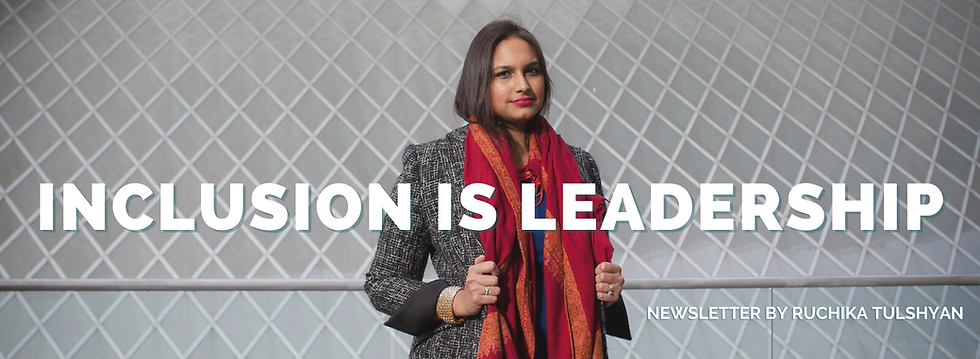Three Ways To Undo This Stat: ¾ of White People Have No Friends of Color
- Ruchika T. Malhotra
- Oct 28, 2021
- 3 min read

I grew up in a conservative culture, where I was taught — many times over — that there was no question that gender is binary. 🤯
For the record, I believe wholeheartedly now that gender isn’t binary. It seems absurd that I ever thought it was! But it took years of listening, reflecting and being uncomfortable with the reality that what I learned growing up was wrong to reach the understanding I have today.
I wrote on LinkedIn last week about this problem: that our social networks aren’t diverse enough by gender identity, race, religion, class, and more. When you consider that most of us are surrounded by the same perspectives and ways of thinking, it’s no wonder that we harbor erroneous beliefs about other people into adulthood.
It’s no wonder, but it’s also no excuse. We have the ability to change our minds, and we must. To do so we need to actively cultivate relationships with people different from us.

These are some ways to start:
Seek out differences intentionally.
Prioritize seeking diversity–difference and especially connection with communities that have been historically marginalized–in the businesses you frequent, like buying from women- and minority-owned vendors. The next time you go out to eat or purchase a gift, take the extra time to source from businesses from underestimated communities. There are great resources to spend money more intentionally, including my friend Laura Clise’s fantastic guide, Intentionalist.
Further, seek out diversity in your social circle. I’m not suggesting you tokenize anyone by befriending them just because they are from an underrepresented community (trust me, we can tell!) But next time you’re at an event, notice who you gravitate to — I bet they look like you! Challenge yourself to connect with someone different, and approach them with openness. An easy way to start a conversation, even online? Ask, “what are you reading these days?” or “tell me about yourself.”
Seek out diversity professionally.
We must also cultivate professional networks that are diverse in every way. For people who are hiring, I always recommend advertising job listings with identity-based networks. Don’t just list job openings on the company website, reach out to groups that focus on underrepresented groups — and there are many — like Black Girls Code or Society of Hispanic Professional Engineers.
And take time to attend events that are focused on serving underestimated groups. Seek recommendations on which networks are community-serving and led by community leaders from a diverse group of people. Cultivating these networks allows you to draw upon them to more effectively diversify the workplace.
Develop insight from a diverse slate of resources.
To understand all the beautiful and fascinating ways we are different, seek out points of view that are different from your own. I’m talking about films, books, festivals, cultural events and media focused on a diversity of experiences and communities.
When it comes to friendships and professional relationships, if someone shares an experience or opinion that is unfamiliar don’t shut it down. Listen without interruption or defensiveness, and thank them sincerely for sharing, especially if they are revealing something about their identity or heritage. Cultural awareness and understanding can’t only be developed when you’re surrounded by familiar perspectives.
PSA: I am not recommending you engage with trolls or people who spread harmful ideas about underrepresented groups.
What makes me hopeful.
In my own work helping companies to develop strategies that foster diversity and inclusion, I’ve seen progress when white, male leaders regularly educate themselves and attend corporate events focused on advancing women or people of color.
They learn to empathize with the barriers underestimated people face. One male leader I spoke to said reading So You Want to Talk About Race by Ijeoma Oluo urged him to engage in tough but meaningful conversations about racial equality at work.
A lack of diversity in your personal life can have unintended consequences when you get to the office, the school board, the neighborhood association.
But intentional action to diversify who you engage within all areas of life leads to real change.

.png)



Comments